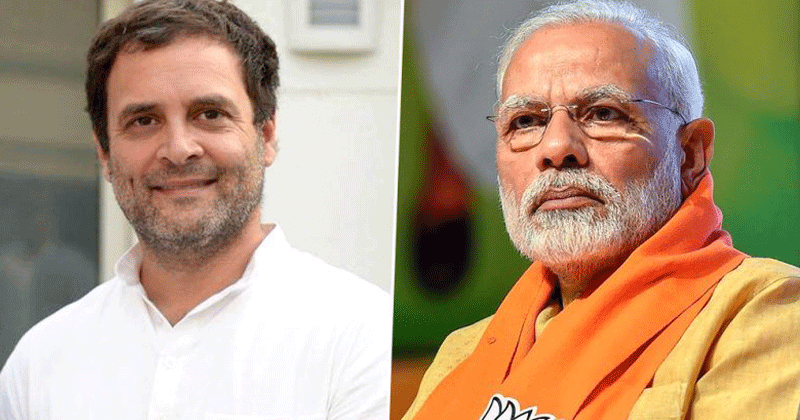
After the BJP had slammed the Congress party for being a party that caters to Muslim men and not women, Rahul Gandhi writes to PM Modi to walk his talk.
Congress President Rahul Gandhi wrote to Prime Minister Narendra Modi asking him to ‘walk his talk’ by bringing the Women’s Reservation Bill in the monsoon session of Parliament. Congress would support the bill, Rahul Gandhi wrote in his letter.
Rahul Gandhi had shared the letter on his Twitter account:
Our PM says he’s a crusader for women’s empowerment? Time for him to rise above party politics, walk-his-talk & have the Women’s Reservation Bill passed by Parliament. The Congress offers him its unconditional support.
Attached is my letter to the PM. #MahilaAakrosh pic.twitter.com/IretXFFvvK
— Rahul Gandhi (@RahulGandhi) July 16, 2018
Rahul urged Modi to ensure that the Bill gets passed in the upcoming session itself so that women can participate “more meaningfully” in the state elections later this year and in the Lok Sabha polls next year. “Mr. Prime Minister, in many of your public rallies you have spoken about your passion for empowering women and involving them more in public life,” he tweeted.

In the letter, Rahul wrote: “BJP appears to have had second thoughts even though this [Women’s Reservation Bill] was one of its key promises in its 2014 manifesto.”
READ ALSO: “PM gives out wrong statements” says Congress slamming PM Modi
Only 11.8% of members of Parliament in Lok Sabha are women. In contrast, Nepal has 32.8% representation of women in the legislative Parliament, while in Bangladesh there is 20% representation of women in Parliament.
Citing this data from “Women in Politics 2017 map” brought out by the Inter-Parliamentary Union and UN Women, the ‘National Alliance for Women’s Reservation Bill’ recently demanded that the BJP-led NDA government must take up the long-pending issue in the coming monsoon session of Parliament and table the Bill in the House.
“There are 96 women in both Houses of Parliament. In Lok Sabha, out of 543 MPs, 65 are women and in Rajya Sabha, there are 31 women members out of 243 MPs,” a ‘fact sheet’ put out by the Alliance states to reinforce its point. Led by women organizations, the Alliance has stated that “the Women’s Reservation Bill seems to have completely disappeared from the agenda of the present NDA government even after their election promise of ‘not 33 but 50%’.”
In their statement, the Alliance said, “The Bill has been discussed thoroughly by two parliamentary committees, the second one submitting its Report in December 2009 which endorsed the Bill as it was. With the historic passage of the 33% Women’s Reservation Bill in the Rajya Sabha on 9th March 2010, women of this country were very optimistic that the Bill would soon be passed by the Lok Sabha and become a law. Unfortunately, this was not to be. The Bill eventually lapsed following the dissolution of the 15th Lok Sabha in 2014.” It is further stated that “the current Government which came to power in May 2014 has not moved on this front at all.” Successive governments have thus shelved the Women’s Reservation Bill on the pretext of what they call ‘lack of political consensus’.
“While the enactment of the 73rd and 74th Constitutional amendments has facilitated the entry of lakhs of women in villages, small towns, and cities, into the political arena was a welcome step, women are still struggling to secure the same in Parliament and state legislatures, which continues to be around 10% or less of the total number of members,” Ranjana Kumari from the Centre for Social Research said. Women leading self-help groups and panchayats in their villages from states like Rajasthan, Haryana, and Chattisgarh shared their experiences and success stories to point how they are trying to empower women at the grassroots.
BJP HITS BACK
However, the BJP was quick to accuse the opposition party of adopting “double standard” on the matter by siding with those who were opposed to the bill and asked if the Congress could assure support of its allies, in an apparent reference to parties like Lalu Prasad Yadav-led RJD and Mulayam Singh Yadav’s Samajwadi Party.
The Rajya Sabha had passed the constitutional amendment bill on March 9, 2010, to facilitate reserving one-third of total seats in state assemblies and Parliament for women, but the Lok Sabha never voted on it and the proposed legislation lapsed after the dissolution of the 15th Lok Sabha in 2014. “

Post Your Comments